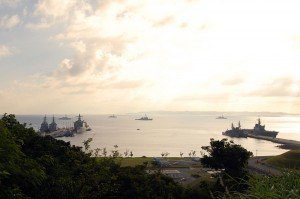Japan needs to listen to the people of Okinawa: U.S. base and Central Government threat
Sawako Utsumi and Lee Jay Walker
Modern Tokyo Times

The majority of the United States military bases in Japan are located in Okinawa, rather than mainland Japan. This enormous discrepancy when related to land size and population factors is viewed negatively by many Okinawans. Indeed, irrespective of the geopolitical merits of the United States military bases being located in Okinawa, it still relates to Japan deeming this part of the nation to be expendable. After all, in the worse case scenario of a military conflict in Northeast Asia, it is clear that any aggressor would focus on Okinawa given the American military angle.
Equally important, why isn’t the central government of Japan ushering in a policy that creates a more equitable burden throughout the nation? After all, the region of Northern Japan could be deemed an area of heightened importance in relation to North Korea and the Russian Federation. Of course, relations between Japan and the Russian Federation are more than cordial. However, nations must focus on the worse case scenario and relate this to geopolitics. Therefore, it seems that Okinawa is a convenient escape clause for the central government of Japan, in relation to placating the numbers of military personnel from America based on political and military agreements between both nations.
Deutsche Welle reported earlier this month, “The demonstrators want the base — the US Marine Corps Air Station Futenma — removed entirely from Japan’s southern island. In addition, they argue that building a new base at the remote Henoko Bay site would damage the local environment.”
Hence, when an estimated 70,000 people turn out to demonstrate (some state the figure was higher) against the building of another United States military base in Okinawa – and with the central government knowing that the majority of Okinawans are disillusioned – it then appears that political elites in Tokyo are treating this part of Japan with disdain. If the burden of United States bases and military personnel in Japan were shared more equally, then the majority of people in Okinawa would be more sympathetic. Yet, it is unfair to put so much pressure on Okinawa especially given the fact that this area once was independent until the later part of the nineteenth century.
In this light, the threat of the central government in fining the prefecture of Okinawa with a fine of 20 million yen a day is excessive. This fine is based on the suspension of the reclamation project of the United States military base and the outcome of a legal dispute. Irrespective if the central government enacts an economic angle, it is clear that the administration of Prime Minister Shinzo Abe is intent on “twisting political arms in Okinawa.”
Earlier this year, Abe uttered, “I would like to proceed (with the relocation) based on a ruling by the Supreme Court of Japan, while seeking understanding of the public.”
Reuters reports, “Japan’s central government and authorities on Okinawa – reluctant host to the bulk of U.S. military forces in the country – have bickered for years over the plan, first agreed between Tokyo and Washington in 1996.”
In a past article by Modern Tokyo Times, it was stipulated, “It is abundantly clear that Okinawa is very important when it applies to geopolitics. Yet, Japan should have enforced a more equal distribution of military bases being located throughout the nation. Also, the richness of wildlife and the bountiful opportunities for tourism in Okinawa – alongside preserving Okinawan culture and identity – should equally have been put at the top of the agenda. However, it appears that elites in Tokyo believe that they can enforce a diktat on the people of Okinawa based on being so remote from the vestiges of power in the capital.”
If the central government utilizes the economic angle against the people of Okinawa, then this pressure is merely confirming the gap between political elites in Tokyo and the majority of people in Okinawa who oppose the uneven military burden. Also, just like in the last major war involving Japanese military forces, it seems that Okinawa is a willing sacrifice to be made in the defense of mainland Japan.
https://www.dw.com/en/thousands-in-okinawa-protest-us-marine-base-relocation/a-45046501

Modern Tokyo News is part of the Modern Tokyo Times group
DONATIONS to SUPPORT MODERN TOKYO TIMES – please pay PayPal and DONATE to sawakoart@gmail.com
http://moderntokyotimes.com Modern Tokyo Times – International News and Japan News
http://sawakoart.com – Sawako Utsumi personal website and Modern Tokyo Times artist
https://moderntokyonews.com Modern Tokyo News – Tokyo News and International News
http://global-security-news.com Global Security News – Geopolitics and Terrorism
PLEASE JOIN ON TWITTER
https://twitter.com/MTT_News Modern Tokyo Times
PLEASE JOIN ON FACEBOOK